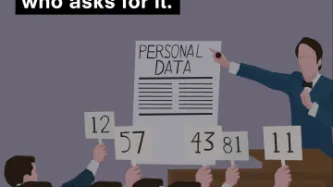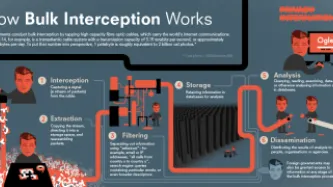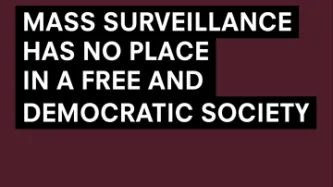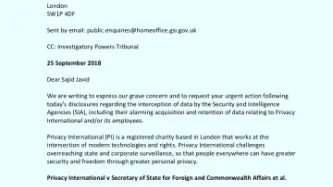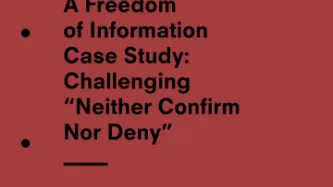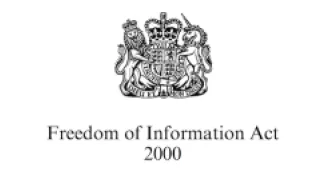Search
Content type: Examples
In November 2018, the UK government announced it would pilot voter ID for in 11 local authorities during thte 2019 local elections in order to gain insight into ensuring voting security and lowering the risk of voter fraud. The Cabinet Office deemed the pilots conducted in five local authorities during the 2018 local elections to be a success. Four models of checking are under consideration: photo ID (Pendle, East Staffordshire, Woking); one photo or up to two non-photo IDs (Ribble Valley,…
Content type: Examples
A database compiled through investigations conducted in 2018 by the Guardian and the Undercover Research Group network of activists shows that undercover police officers spied on 124 left-wing activist groups between 1970 and 2007. The police infiltrated 24 officers over that time within the Socialist Workers Party, which, with a membership of a few thousand, advocates revolution to ablish capitalism. Four of these undercover officers began sexual relationships with deceived female members, and…
Content type: Examples
In 2018, after the UK Cabinet Office said a trial of compulsory voter ID was necessary because reports of voter fraud had more than doubled between the 2014 and 2016 elections - a claim immediately disputed by a voter and upheld by the UK Statistics Authority. While it was true that there were 21 reports in 2014 and 44 in 2016, the number fell to 28 in 2017, small numbers to begin with. Crucially, more than twice as many people voted in 2016, the year of the EU referendum. None of the five…
Content type: Examples
In 2018 a report from the Royal United Services Institute found that UK police were testing automated facial recognition, crime location prediction, and decision-making systems but offering little transparency in evaluating them. An automated facial recognition system trialled by the South Wales Police incorrectly identified 2,279 of 2,470 potential matches. In London, where the Metropolitan Police used facial recognition systems at the Notting Hill Carnival, in 2017 the system was wrong 98% of…
Content type: Examples
In October 2018, in the wake of the Cambridge Analytica scandal and questions over Facebook's influence on the UK's EU referendum, Facebook announced it would add Britain to the US and Brazil on the list of countries where the company will no longer allow political groups to publish "dark" ads on its network. Among the changes: all paid-for political content will be automatically published in a public library for up to seven years; individuals and organisations running ads with political…
Content type: Long Read
As our four year battle against the UK government’s extraordinarily broad and intrusive hacking powers goes to the Supreme Court, we are launching a new fundraising appeal in partnership with CrowdJustice.
We are seeking to raise £5k towards our costs and need your help. If we lose, the court may order us to pay for the government’s very expensive army of lawyers. Any donation you make, large or small, will help us both pursue this important case and protect the future ability of…
Content type: News & Analysis
Email addresses
Acxiom: [email protected]
Criteo: [email protected]
Equifax: [email protected]
Experian: [email protected]
Oracle: https://oracle.ethicspointvp.com/custom/oracle/dp/en/form_data.asp
Quantcast: [email protected] cc: [email protected]
Tapad: [email protected]
Letter for Acxiom and Oracle
subject line: Right to Erasure Request
I am concerned your company exploits my data.
In accordance with my right[s] under the General Data…
Content type: News & Analysis
Our team wanted to see how data companies that are not used to being in the public spotlight would respond to people exercising their data rights. You have the right under the EU General Data Protection Regulation ("GDPR") to demand that companies operating in the European Union (either because they are based here or target their products or services to individuals in the EU) delete your data within one month. We wrote to seven companies and requested that they delete our data, and we've made…
Content type: Press release
Today, Privacy International has filed complaints against seven data brokers (Acxiom, Oracle), ad-tech companies (Criteo, Quantcast, Tapad), and credit referencing agencies (Equifax, Experian) with data protection authorities in France, Ireland, and the UK. Privacy International urges the data protection authorities to investigate these companies and to protect individuals from the mass exploitation of their data.
Our complaints target companies that, despite exploiting the data of millions of…
Content type: Advocacy
Today, Privacy International has filed complaints against seven data brokers (Acxiom, Oracle), ad-tech companies (Criteo, Quantcast, Tapad), and credit referencing agencies (Equifax, Experian) with data protection authorities in France, Ireland, and the UK.
It’s been more than five months since the EU’s General Data Protection Regulation (GDPR) came into effect. Fundamentally, the GDPR strengthens rights of individuals with regard to the protection of their data, imposes more…
Content type: Long Read
Photo credit: Pixabay
This piece was originally published in iNews
It seems that you can’t go anywhere online at the moment without being reassured that ‘we respect your privacy’ and being directed to a 2,000-word privacy policy. You probably just click ‘got it, thanks’ because who has the luxury to stop and think about what their ‘privacy’ actually means?
But privacy is something that starts becoming far less abstract when you can see how it is being threatened and undermined, every day and…
Content type: Long Read
This piece was originally published in Just Security.
Earlier this month, the European Court of Human Rights issued a major judgment in three consolidated cases challenging the U.K. government’s mass interception program, which was first revealed by Edward Snowden in 2013. That judgment finds notable deficiencies in the legal framework governing mass interception, rendering the program unlawful under Articles 8 and 10 of the European Convention on Human Rights (ECHR), which protect the rights…
Content type: Long Read
Written jointly by Privacy International and the American Civil Liberties Union (ACLU).
In a landmark decision earlier this month, the European Court of Human Rights ruled that one of the mass surveillance programs revealed by Edward Snowden violates the rights to privacy and freedom of expression. While the case challenges the U.K. government’s mass interception of internet traffic transiting its borders, the court’s judgment has broader implications for mass spying programs in Europe and…
Content type: Long Read
The UK's domestic-facing intelligence agency, MI5, today admitted that it captured and read Privacy International's private data as part of its Bulk Communications Data (BCD) and Bulk Personal Datasets (BPD) programmes, which hoover up massive amounts of the public's data. In further startling legal disclosures, all three of the UK's primary intelligence agencies - GCHQ, MI5, and MI6 - also admitted that they unlawfully gathered data about Privacy International or its staff. You can read the…
Content type: Press release
Thames House, Offices of MI5. Photo Credit: Wikimedia Commons
MI5 collected Privacy International’s private data and examined it
GCHQ, MI5, and MI6 unlawfully collected data relating to UK charity Privacy International
Privacy International has written to the UK's Home Secretary demanding action against spy agencies
Disclosures come less than a fortnight after UK laws on mass surveillance ruled unlawful at European Court of Human Rights
The UK's domestic-facing intelligence…
Content type: Long Read
Yesterday, the European Court of Human Rights issued its judgement in Big Brother Watch & Others V. the UK. Below, we answer some of the main questions relating to the case.
What's the ruling all about?
In a nutshell, one of the world's most important courts, the European Court of Human Rights, yesterday found that certain UK laws about how intelligence agencies can spy on our internet communications breach our human rights. These surveillance laws have meant that the UK intelligence…
Content type: News & Analysis
Today was a big day for the privacy of millions of people. The European Court of Human Rights has today ruled that UK laws enabling mass interception of our communications violate the rights to privacy and freedom of expression. This finding is an important victory for human rights and the rule of law.
The judges found that:
The UK’s historical bulk interception regime violated the right to privacy protected by Article 8 of the European Convention on Human Rights (ECHR) and to free…
Content type: Long Read
The European Court of Human Rights ruled today that the UK government's mass interception program violates the rights to privacy and freedom of expression. The Court held that the program "is incapable of keeping the 'interference' to what is 'necessary in a democratic society'". This finding is an important victory for human rights and the rule of law. Below, we break down the key parts of the decision.
The Court's ruling comes after a five-year battle against two UK mass surveillance…
Content type: Press release
The European Court of Human Rights has today ruled that UK laws enabling mass surveillance violate the rights to privacy and freedom of expression.
Judges found that:
The UK’s historical bulk interception regime violated the right to privacy protected by Article 8 of the European Convention on Human Rights (ECHR) and to free expression, protected by Article 10.
The interception of communications data is as serious a breach of privacy as the interception of content, meaning the UK…
Content type: Press release
Privacy International, represented by Liberty, is challenging court decision allowing police to ‘neither confirm nor deny’ they hold certain information on IMSI catchers
Privacy rights organisation has fought for almost two years for public disclosure of records on how UK police purchase and use mobile phone surveillance technology
Privacy International has today filed an appeal challenging police forces’ refusal to disclose information on their purchase and use of IMSI catchers.
IMSI…
Content type: Report
The Information Commissioner’s Office (ICO) recently issued a series of decisions in Privacy International’s long-running battle for information about UK police forces' acquisition of IMSI catchers. This case study provides an in-depth summary and analysis of this process.
We hope it is useful to both campaigners seeking greater transparency from policing bodies, and more widely to Freedom of Information campaigners who are trying to challenge 'neither confirm nor deny' responses to FOI…
Content type: News & Analysis
Create Commons Photo Credit: Source
Privacy International has achieved an important victory for government transparency and information access rights. This victory stems from a long-running battle with the government to obtain information about the UK police’s purchase and use of IMSI catchers. The Information Commissioner’s Office (ICO) recently issued a series of decisions, which agree with Privacy International that police forces cannot rely on a position of “neither confirm nor deny” (NCND…
Content type: Press release
Creative Commons Photo Credit: Source
Have the police been unlawfully hacking our phones? Privacy International refers this question to Lord Justice Sir Adrian Fulford, the Investigatory Powers Commissioner
Privacy International has formally written to the UK's Investigatory Powers Commissioner about the police's use of intrusive 'mobile phone extraction' (MPE) technology, raising concerns about whether in some, or indeed in all circumstances, its use constitutes either an interception…
Content type: Press release
We found this image here.
The National Police Chiefs’ Council (NPCC) will no longer be able to operate in secret after human rights campaign organisations Liberty and Privacy International demanded it be subject to Freedom of Information laws.
The Government has now informed the organisations that it has started a process to designate the law enforcement policy-making body as a public authority subject to the Freedom of Information Act (FOIA) – meaning it will be open to public scrutiny.…
Content type: Press release
We found this image here
The Investigatory Powers Tribunal (IPT) today held that, for a sustained period, successive Foreign Secretaries wrongly gave GCHQ unfettered discretion to collect vast quantities of personal customer information from telecommunications companies.
The judgment exposes:
· the error-ridden and inconsistent evidence provided by GCHQ throughout the case;
· the willingness of telecommunications companies to secretly hand over customer data on the basis of mere verbal…
Content type: Long Read
How would you feel if you were fingerprinted by the police before you were allowed to take part in a peaceful public demonstration?
As tens of thousands of people attend massive public demonstrations across the UK today against US President Donald Trump in a ‘Carnival of Resistance’, it’s a question worth asking. Why? Because the police now deploy a range of highly sophisticated surveillance tools at public events which are just as if not more intrusive. And these technologies should be even…
Content type: Long Read
Yesterday the UK's Information Commissioner's Office (ICO) - which is responsible for ensuring people's personal data is protected - announced it intends to fine Facebook the maximum amount possible for its role in the Cambridge Analytica scandal.
This decision highlights of how serious and rampant misuse and exploitation of data is. Facebook is responsible and failed to comply with data protection 101: be upfront and honest about what you are doing with people's data.
Importantly, the ICO's…
Content type: News & Analysis
In order to uphold the law and keep us safe, the police can seriously interfere with a range of fundamental human rights. And so transparency and public scrutiny of their actions are essential to protect against misconduct and abuse.
So why is the National Police Chiefs’ Council (NPCC) now permitted to operate in secret?
We all have the right to seek information from most public bodies – including the police – under the Freedom of Information Act (FOIA) 2000. When the law was first…
Content type: News & Analysis
While the worlds’ attention, the world’s humour, including a dedicated playlist of 89 songs on Spotify, were on the coming into force of EU’s General Data Protection Regulation (GDPR) on 25th May, the UK’s Data Protection Act 2018 (DPA 2018) that received Royal Assent only two days previously had barely received a few column inches in the mainstream press.
However, the substance of the debates in parliament during the passage of this Act has received wide…
Content type: Press release
Privacy International (PI) has today urged England Manager Gareth Southgate to bolster his defence ahead of the World Cup in Russia, which kicks off next Thursday. PI sent Southgate an anti-surveillance 'Faraday cage' phone pouch and a briefing on his vulnerability to potential spying by rival football managers and foreign governments intent on giving their team a competitive advantage. If rival governments routinely hack and intercept each other's communications, what's stopping rival teams'…







